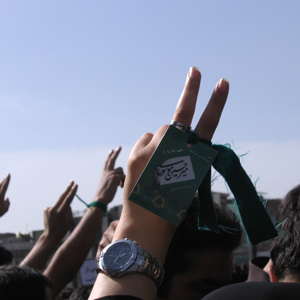West, Pragmatic towards Iran’s Elections
Western countries have decided not to tie their relations with Iran to a certain group. by Ali Khorram, political analyst.

Foreign countries have taken a rational stance on Iran’s presidential election, deciding not to endorse a certain candidate or group. As to aftermath of the elections, they left domestic struggles to Iranians and stressed that Iranian officials and the Iranian nation should make the final decision on the post-election developments.
Except for Arab countries, nearly all foreign countries followed this policy. Western countries which used to frequently criticize the course of developments and policies in Iran, this time acted level-headed against Iranian presidential elections.
Meanwhile, Western countries have called for observing such as human rights (asking for Islamic Republic’s tolerance against the protestors), integrity of the elections and the rights of those who protested to the results. Meanwhile, they demanded the protestors to follow peaceful means to achieve their goal.
However, foreign countries have not yet decided on a certain policy to adopt vis-à-vis the course of events in Iran. It seems that they are waiting for the ultimate outcome of the developments. Notwithstanding, the common point is that whoever becomes in charge of the administration, they are ready to cooperate with him. This is a positive point per se, since it shows that whether Musavi or Ahmadinejad, West has decided to move on with the developments.
Prior to this, foreign countries favored certain figures and groups inside the Iranian political system, but their recent stances show that they have adopted neutrality as their new policy towards Iran’s domestic developments and they are not willing to intervene with Iran’s internal affairs. They believe that in the current circumstances, any meddling with Iran’s domestic developments and taking a partisan stance will only make things more complex. The case is different for Arab countries. They tend to prefer certain Iranian politicians to take presidency.
Except for Arab countries, nearly all foreign countries followed this policy. Western countries which used to frequently criticize the course of developments and policies in Iran, this time acted level-headed against Iranian presidential elections.
Meanwhile, Western countries have called for observing such as human rights (asking for Islamic Republic’s tolerance against the protestors), integrity of the elections and the rights of those who protested to the results. Meanwhile, they demanded the protestors to follow peaceful means to achieve their goal.
However, foreign countries have not yet decided on a certain policy to adopt vis-à-vis the course of events in Iran. It seems that they are waiting for the ultimate outcome of the developments. Notwithstanding, the common point is that whoever becomes in charge of the administration, they are ready to cooperate with him. This is a positive point per se, since it shows that whether Musavi or Ahmadinejad, West has decided to move on with the developments.
Prior to this, foreign countries favored certain figures and groups inside the Iranian political system, but their recent stances show that they have adopted neutrality as their new policy towards Iran’s domestic developments and they are not willing to intervene with Iran’s internal affairs. They believe that in the current circumstances, any meddling with Iran’s domestic developments and taking a partisan stance will only make things more complex. The case is different for Arab countries. They tend to prefer certain Iranian politicians to take presidency.

